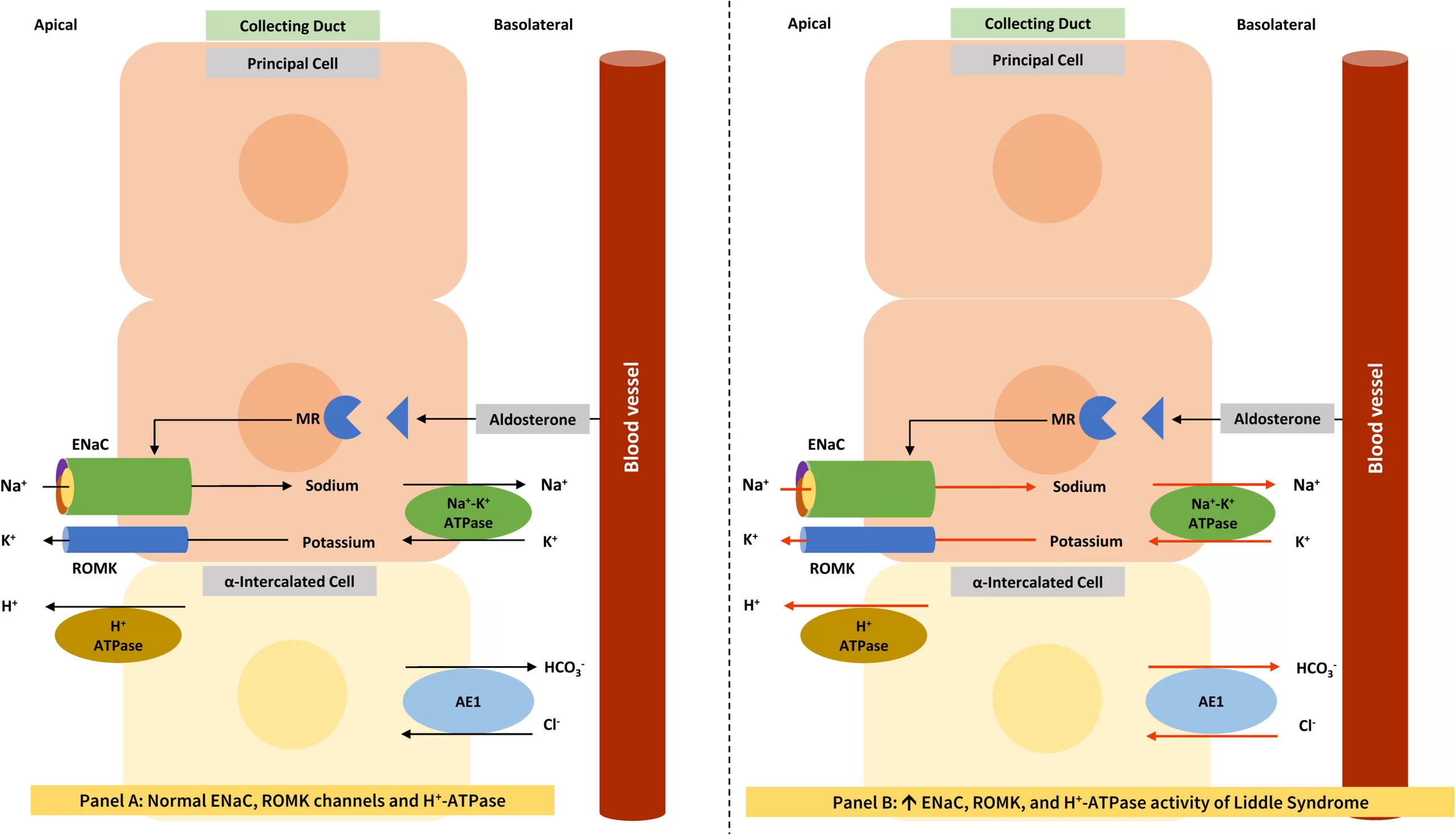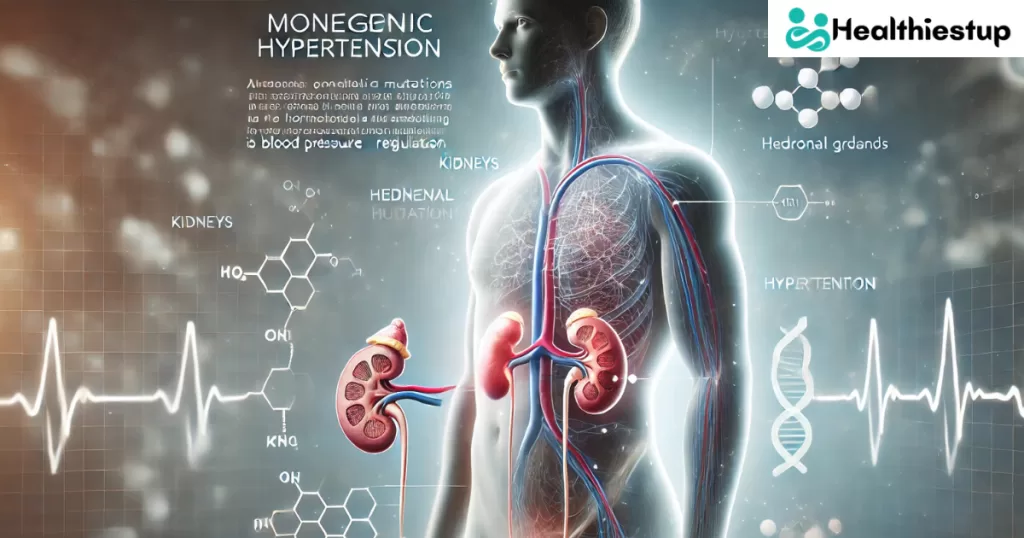Introduction
High blood pressure, or Monogenic hypertension, occurs when the force of blood against the arterial walls is consistently too high. Left unmanaged, this condition can damage blood vessels and contribute to serious health complications.
While hypertension is commonly linked to aging, a sedentary lifestyle, or poor dietary habits, genetics can also play a significant role. Many individuals with an active, healthy lifestyle may still develop high blood pressure due to hereditary factors.
If a parent has high blood pressure, they may pass on genes that increase their child’s likelihood of developing the condition. Familial hypertension may also stem from shared lifestyle patterns within a household—such as smoking, poor dietary habits, or physical inactivity—that contribute to elevated blood pressure over time.
What is Monogenic Hypertension?
Blood pressure measures the force of blood pushing against the walls of the arteries. It is expressed in millimeters of mercury (mm Hg) and recorded as two values:
-
Systolic pressure (the top number): the pressure when the heart beats
-
Diastolic pressure (the bottom number): the pressure when the heart rests between beats
According to the American Heart Association, normal blood pressure is defined as less than 120/80 mm Hg. Readings above this range may indicate elevated blood pressure or hypertension:
| Classification | Systolic (mm Hg) | Diastolic (mm Hg) |
|---|---|---|
| Normal | Less than 120 | Less than 80 |
| Elevated | 120–129 | Less than 80 |
| Stage 1 Hypertension | 130–139 | 80–89 |
| Stage 2 Hypertension | 140 or higher | 90 or higher |

Risk Factors for Hypertension
A number of lifestyle and genetic factors can increase the risk of high blood pressure. These include:
- Family history of hypertension
- High sodium intake
- Excessive alcohol consumption
- Physical inactivity
- Smoking and exposure to secondhand smoke
- Obesity
- Chronic stress
- Inadequate sleep
What makes hypertension particularly concerning is that it often presents no symptoms, even when blood pressure is dangerously high. Regular monitoring is essential to detect and manage the condition early.
In severe cases—where blood pressure rises above 180/120 mm Hg—a hypertensive crisis may occur. This is a medical emergency and can present with symptoms such as:
- Severe headache
- Chest pain
- Nausea
- Shortness of breath
- Fainting or unresponsiveness
Understanding Familial Hypertension
Research indicates that hypertension is a multifactorial condition, influenced by genetic, environmental, and behavioral factors. A 2019 genetic study involving over 750,000 individuals found that variations across hundreds of genes can contribute to high blood pressure, underscoring the complexity of genetic involvement.
According to the Centers for Disease Control and Prevention (CDC), family environments also shape hypertension risk. Shared behaviors such as poor dietary choices, smoking, limited physical activity, and inadequate sleep routines can collectively elevate risk, especially when established early in life.
If you have a family history of high blood pressure, it’s important to be proactive about monitoring your cardiovascular health. Adopting heart-healthy habits and working closely with a healthcare provider can help mitigate your genetic risk and support long-term well-being.
Understanding Monogenic Hypertension
Monogenic hypertension is a form of high blood pressure caused by a single genetic mutation inherited from one parent. It accounts for approximately 30% of hypertension cases and is often associated with electrolyte imbalances, particularly involving potassium.
There are multiple types of monogenic hypertension syndromes, each with distinct causes and clinical features. These include:
- Primary hyperaldosteronism
- Gordon syndrome
- Liddle syndrome
- Geller syndrome
- Hypertension with brachydactyly syndrome (HTNB)
- Mineralocorticoid hypertension
- Congenital adrenal hyperplasia
Managing Hypertension Risk with a Family History
Understanding your family’s medical history is a valuable step in managing personal health risks. If hypertension is prevalent in your family, it is important to communicate this with your healthcare provider and monitor your blood pressure regularly.
A helpful resource for tracking your family’s health history is My Family Health Portrait, a digital tool developed by the National Institutes of Health. This platform allows users to collect and share health data with family members and healthcare professionals while gaining insights into hereditary health risks.
Lifestyle Modifications for Prevention and Management
If your blood pressure is within a healthy range, adopting heart-healthy lifestyle habits can reduce the risk of developing hypertension. For those with elevated blood pressure, these lifestyle changes, in conjunction with prescribed medications, can help achieve better control:
- Maintain a healthy weight
- Limit alcohol consumption
- Engage in regular physical activity
- Avoid tobacco use
Dietary Interventions
The DASH (Dietary Approaches to Stop Hypertension) eating plan, developed by the National Heart, Lung, and Blood Institute, is a proven nutritional strategy to help manage blood pressure. It emphasizes:
- High intake of fruits, vegetables, and whole grains
- Lean protein sources
- Low sodium and saturated fat consumption
This flexible plan is designed to support cardiovascular health while accommodating personal food preferences.
The Role of Sleep
Adequate sleep is essential for cardiovascular health. Poor sleep quality or insufficient sleep—defined as less than 5 to 7 hours per night—has been linked to increased blood pressure. Improving sleep habits may contribute to:
- Better heart and brain health
- Enhanced mood and concentration
- Improved metabolism and energy levels
Key Takeaway
Hypertension is a leading contributor to cardiovascular disease, stroke, chronic kidney disease, and other serious health conditions. Individuals with a family history of high blood pressure should take proactive steps to reduce their risk through lifestyle and behavioral changes.
While antihypertensive medications are effective in managing blood pressure, they are most beneficial when combined with a healthy diet, regular exercise, and sufficient sleep. Even in the absence of a known family history, maintaining a heart-healthy lifestyle remains essential for long-term well-being.
Conclusion
Monogenic hypertension is a genetically inherited form of high blood pressure that requires early recognition and individualized management. Understanding your family medical history and recognizing the signs can be crucial in diagnosing and controlling this condition.
Even for individuals without a known genetic predisposition, adopting heart-healthy habits—such as a balanced diet, regular exercise, quality sleep, and avoiding tobacco—remains essential. When combined with medical supervision and appropriate treatment, these proactive measures can significantly reduce the risk of hypertension-related complications and improve overall cardiovascular health.
FAQ
Q1. What is the difference between monogenic and essential hypertension?
Monogenic hypertension is caused by a single genetic mutation and often presents earlier in life. In contrast, essential (or primary) hypertension develops from a combination of genetic, environmental, and lifestyle factors and is more common in the general population.
Q2. Can monogenic hypertension be cured?
While monogenic hypertension cannot typically be cured, it can be effectively managed with lifestyle changes and targeted medications based on the underlying genetic cause.
Q3. How is monogenic hypertension diagnosed?
Diagnosis usually involves a combination of family medical history, clinical symptoms, blood and urine tests, and sometimes genetic testing to identify specific gene mutations.
Q4. Is monogenic hypertension common?
It is relatively rare, accounting for around 30% of all hypertension cases, and is often underdiagnosed due to overlapping symptoms with other types of high blood pressure.
Q5. Can children have monogenic hypertension?
Yes, monogenic hypertension often presents in childhood or adolescence, especially in familial cases. Early detection is key to preventing long-term complications.



